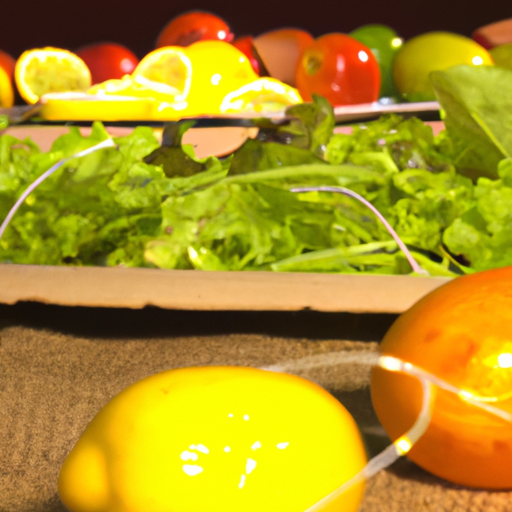
Innovative Strategies for Reducing Food Waste in Our Communities
Food waste is a pressing issue that affects communities all over the world. It not only contributes to environmental problems but also exacerbates hunger and poverty. However, there are innovative strategies being implemented by teams in various communities that are making a significant difference in tackling this issue. In this article, we will shine a light on some of these teams and their efforts to reduce food waste.
One such team is the Food Recovery Network, a student-led organization that operates on college campuses across the United States. Their mission is to recover surplus food from dining halls and local restaurants and redistribute it to those in need. By partnering with local shelters and food banks, they ensure that perfectly good food does not go to waste. This initiative not only reduces food waste but also helps alleviate hunger in the community.
Another team making a difference is the Community Fridge Project. This innovative idea involves setting up refrigerators in public spaces where individuals and businesses can donate excess food. Anyone in need can then access the fridge and take what they need. This simple yet effective solution not only reduces food waste but also fosters a sense of community and solidarity. It empowers individuals to take action and make a positive impact in their neighborhoods.
In addition to these grassroots initiatives, there are also larger organizations working towards reducing food waste on a larger scale. One such organization is ReFED, a nonprofit that brings together businesses, nonprofits, and government agencies to develop data-driven solutions to food waste. They provide valuable insights and resources to help businesses and communities implement effective strategies for reducing waste throughout the food supply chain.
Technology is also playing a crucial role in tackling food waste. Apps like Too Good To Go and Olio connect individuals and businesses with surplus food to those who can use it. These apps allow users to purchase discounted meals or groceries that would otherwise go to waste. By leveraging technology and the power of community, these apps are making a significant impact in reducing food waste and promoting sustainability.
Furthermore, some innovative strategies are being implemented at the production and distribution levels. For example, some farms are using precision agriculture techniques to minimize waste during the growing process. By using data and technology, farmers can optimize irrigation, fertilization, and harvesting, reducing the amount of food that goes to waste due to spoilage or damage.
At the distribution level, companies are implementing smarter inventory management systems to reduce waste. By accurately forecasting demand and optimizing storage and transportation, these companies can minimize the amount of food that goes unsold or spoils before reaching consumers.
In conclusion, there are numerous innovative strategies being implemented by teams in various communities to tackle food waste. From student-led organizations to larger nonprofits, these teams are making a significant difference in reducing waste and alleviating hunger. By leveraging technology, fostering community engagement, and implementing data-driven solutions, these teams are shining a light on the importance of addressing food waste and inspiring others to take action. Together, we can create a more sustainable and equitable future for all.
The Impact of Teamwork in Fighting Food Waste: Success Stories

Food waste is a global issue that affects millions of people every day. It is estimated that one-third of all food produced for human consumption is wasted, amounting to approximately 1.3 billion tons of food wasted each year. This is not only a waste of resources but also contributes to environmental problems such as greenhouse gas emissions and deforestation. However, there are teams all around the world that are working tirelessly to tackle this issue and make a difference in their communities.
One such team is the Food Recovery Network, a student-led organization that aims to fight food waste and hunger in the United States. They work with college campuses to recover surplus food from dining halls and events and redistribute it to those in need. Through their efforts, they have been able to recover millions of pounds of food that would have otherwise gone to waste. This not only helps to reduce food waste but also provides nutritious meals to individuals who are struggling with food insecurity.
Another team making a difference in the fight against food waste is Feedback, an organization based in the United Kingdom. They work with farmers, retailers, and consumers to reduce food waste at every stage of the supply chain. One of their initiatives, called Feeding the 5000, involves organizing large-scale public events where meals are made from ingredients that would have otherwise been wasted. These events not only raise awareness about the issue of food waste but also provide a delicious meal to thousands of people.
In Australia, the OzHarvest team is leading the charge in reducing food waste and feeding those in need. They rescue surplus food from supermarkets, restaurants, and other food businesses and distribute it to charities across the country. Through their efforts, they have been able to rescue millions of kilograms of food and provide millions of meals to vulnerable individuals. They also run educational programs to raise awareness about food waste and inspire individuals and businesses to take action.
In India, the Robin Hood Army is a team of volunteers who are fighting food waste and hunger in a unique way. They collect surplus food from restaurants and distribute it to those in need, focusing on marginalized communities. What sets them apart is their approach of using technology and social media to mobilize volunteers and coordinate food drives. Through their efforts, they have been able to serve millions of meals to those who would otherwise go hungry.
These are just a few examples of the many teams around the world that are making a difference in the fight against food waste. Their dedication, passion, and teamwork are truly inspiring. By working together, they are able to have a greater impact and create lasting change in their communities.
In conclusion, the impact of teamwork in fighting food waste cannot be underestimated. These teams are shining a light on the issue and showing us that by working together, we can make a difference. Whether it’s recovering surplus food, raising awareness, or mobilizing volunteers, each team is playing a crucial role in tackling this global problem. Their success stories serve as a reminder that with determination and collaboration, we can create a world where no one goes hungry and where food waste is a thing of the past.
Raising Awareness: How Our Teams are Educating Others about Food Waste
At our company, we believe in the power of education and awareness to bring about positive change. That’s why we have dedicated teams working tirelessly to tackle the issue of food waste. These teams are not only focused on finding innovative solutions to reduce waste within our own operations but also on educating others about the importance of this issue.
One of the ways our teams are raising awareness about food waste is through community outreach programs. They organize workshops and seminars in schools, community centers, and local events to educate people about the impact of food waste on the environment and society. These events are not only informative but also interactive, with hands-on activities that engage participants and make the learning experience enjoyable.
Our teams also collaborate with local organizations and non-profits to spread the message about food waste. They work together to organize food drives and donation campaigns, encouraging people to donate excess food to those in need instead of letting it go to waste. By partnering with these organizations, we are able to reach a wider audience and make a bigger impact in our communities.
In addition to community outreach, our teams are also using social media platforms to raise awareness about food waste. They regularly post informative content, tips, and tricks on how to reduce waste in the kitchen, and share success stories of individuals and businesses who have made a difference. By leveraging the power of social media, we are able to reach a global audience and inspire others to take action.
Another way our teams are educating others about food waste is through partnerships with local restaurants and grocery stores. They work closely with these establishments to implement waste reduction strategies, such as composting programs and portion control measures. By showcasing the success of these initiatives, our teams are able to demonstrate that reducing food waste is not only good for the environment but also for the bottom line of businesses.
Furthermore, our teams are actively involved in research and development to find innovative solutions to food waste. They collaborate with scientists, engineers, and food experts to develop new technologies and processes that can help reduce waste throughout the supply chain. By staying at the forefront of innovation, our teams are able to lead the way in finding sustainable solutions to this pressing issue.
In conclusion, our teams are making a significant impact in tackling food waste by raising awareness and educating others. Through community outreach programs, social media campaigns, partnerships with local establishments, and research and development efforts, they are spreading the message about the importance of reducing waste and inspiring others to take action. By shining a light on our teams’ efforts, we hope to encourage more individuals and businesses to join us in the fight against food waste. Together, we can make a difference and create a more sustainable future.


